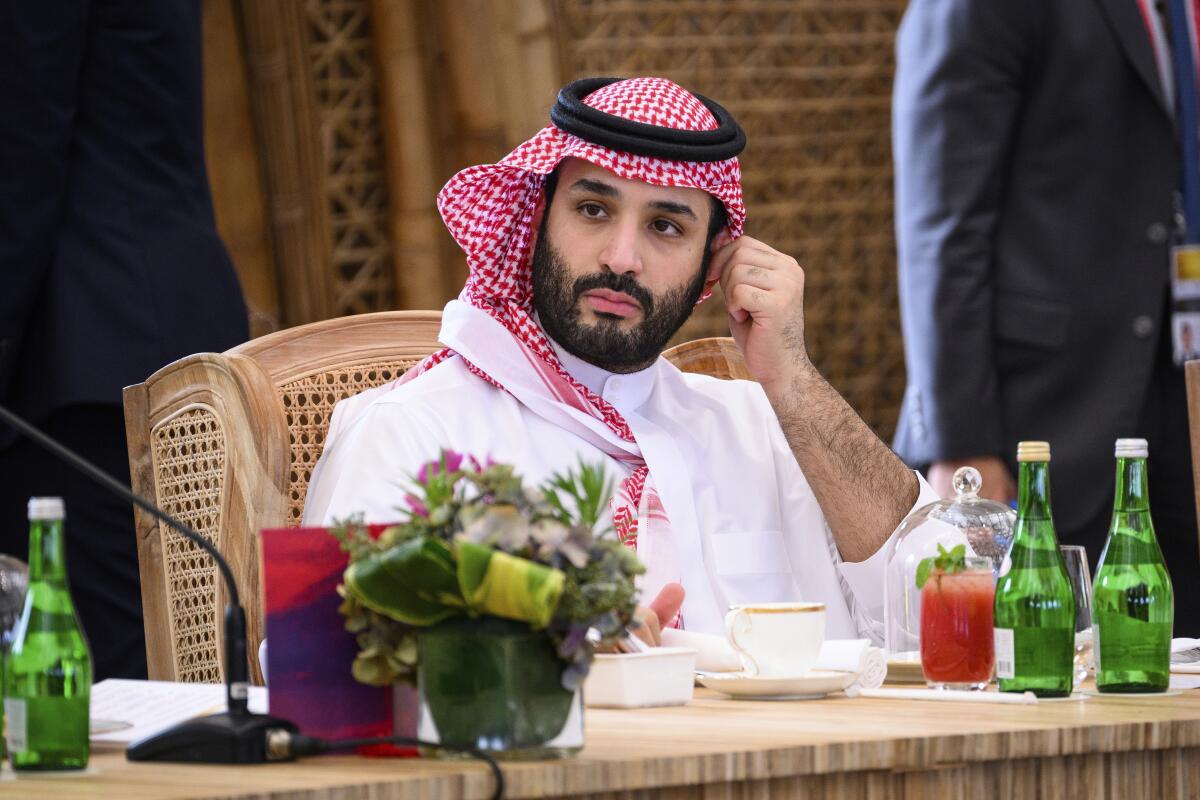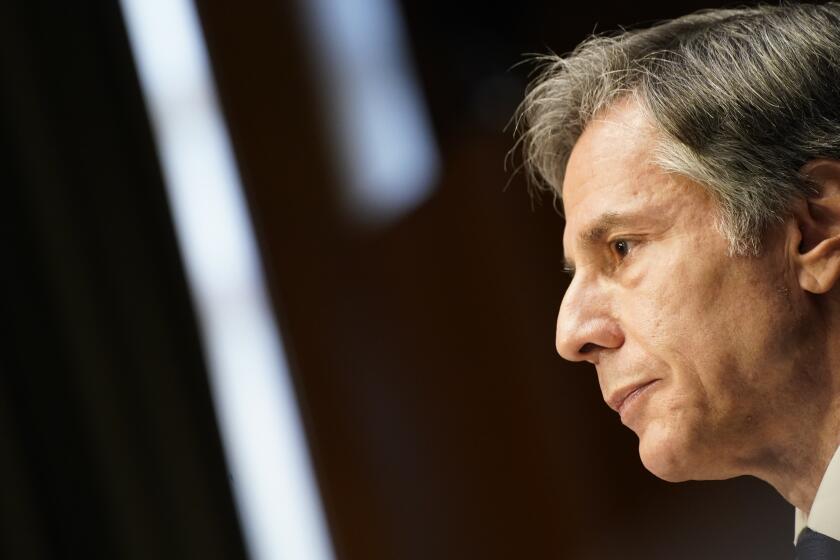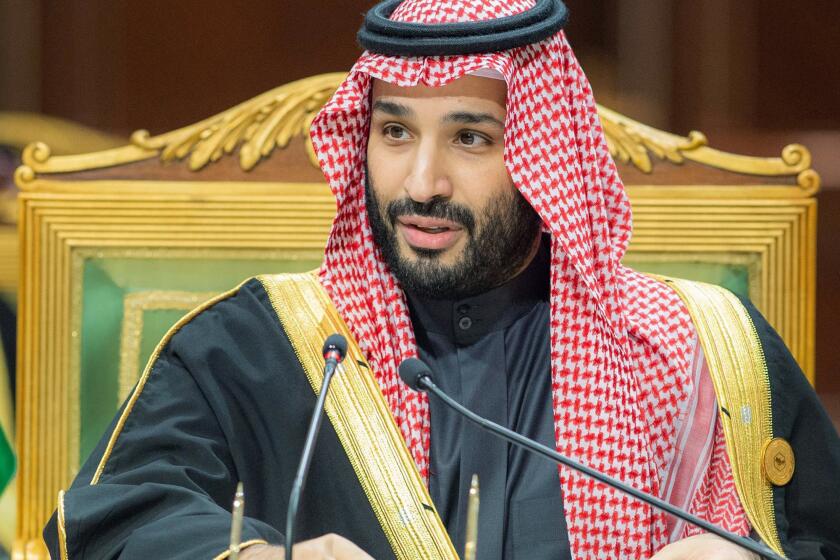U.S. moves to shield Saudi crown prince from lawsuit in Khashoggi killing

- Share via
WASHINGTON — The Biden administration says Saudi Crown Prince Mohammed bin Salman’s high office should shield him from a lawsuit over his alleged role in the killing of a U.S.-based journalist, marking a turnaround from President Biden’s passionate campaign trail denunciations of the prince over the brutal slaying.
The administration spoke in support of a claim of legal immunity by the prince — Saudi Arabia’s de facto ruler, who also recently took the title of prime minister — against a suit brought by the fiancee of slain Washington Post columnist Jamal Khashoggi and by the rights group Khashoggi founded, Democracy for the Arab World Now.
“Jamal died again today,” Khashoggi’s fiancee, Hatice Cengiz, tweeted after the U.S. filing late Thursday in her lawsuit.
The U.S. government’s assertion of immunity for the crown prince, who is sometimes known as MBS, is nonbinding, and a judge will ultimately decide whether to grant immunity. But it angered rights activists and risked blowback from Democratic lawmakers. The U.S move came as Saudi Arabia has stepped up imprisonment and other retaliation against peaceful critics at home and abroad and has cut oil production, a move seen as undercutting efforts by the U.S. and its allies to punish Russia for its war against Ukraine.
The State Department on Thursday called the administration’s call to shield the prince from U.S. courts in Khashoggi’s 2018 killing “purely a legal determination.” It cited what it called longstanding precedent.
Despite its recommendation to the court, the State Department said in its filing late Thursday that it “takes no view on the merits of the present suit and reiterates its unequivocal condemnation of the heinous murder of Jamal Khashoggi.”
President Biden met with the Saudi royal family in Jidda on Friday, after having said he would marginalize the oil-rich kingdom. He said he confronted Saudi Crown Prince Mohammed bin Salman over the slaying of journalist Jamal Khashoggi.
Saudi security agents killed Khashoggi at the Saudi Consulate in Istanbul. They are believed to have dismembered him, although his remains have never been found. The U.S. intelligence community concluded that the crown prince had approved the killing of the widely known and respected journalist, who had written critically of the prince’s harsh ways of silencing those he considered rivals or critics.
The Biden administration statement Thursday noted visa restrictions and other penalties that it had meted out to lower-ranking Saudi officials in the death.
“From the earliest days of this Administration, the United States Government has expressed its grave concerns regarding Saudi agents’ responsibility for Jamal Khashoggi’s murder,” the State Department said. Its statement did not mention the crown prince’s alleged role.
As a presidential candidate, Biden had vowed to make a “pariah” of Saudi rulers over Khashoggi’s slaying.
Saudis accuse U.S. of politicizing oil, refuse to obey ‘dictates’; U.S. says relationship is being reconsidered.
“I think it was a flat-out murder,” Biden said in a 2019 CNN town hall. “And I think we should have nailed it as that. I publicly said at the time we should treat it that way and there should be consequences relating to how we deal with those — that power.”
But Biden as president has sought to ease tensions with the kingdom, including bumping fists with the crown prince on a July trip to the kingdom, as the U.S. works to persuade Saudi Arabia to undo a series of cuts in oil production.
Cengiz and Democracy for the Arab World Now sued the prince, his top aides and others in Washington federal court over their alleged roles in Khashoggi’s death. Saudi Arabia says the prince had no direct role in the slaying.
“It’s beyond ironic that President Biden has singlehandedly assured MBS can escape accountability when it was President Biden who promised the American people he would do everything to hold him accountable,” Sarah Leah Whitson, the head of Democracy for the Arab World Now, said in a statement.
Start your day right
Sign up for Essential California for the L.A. Times biggest news, features and recommendations in your inbox six days a week.
You may occasionally receive promotional content from the Los Angeles Times.
Biden in February 2021 had ruled out the U.S. government imposing punishment on the crown prince himself in the killing of Khashoggi, who was a resident of the Washington area. Biden, speaking after he authorized release of a declassified version of the intelligence community’s findings on the prince’s role in the killing, argued at the time that there was no precedent for the U.S. to move against the leader of a strategic partner.
The U.S. military long has safeguarded Saudi Arabia from external enemies in exchange for Saudi Arabia keeping global oil markets afloat.
“It’s impossible to read the Biden administration’s move today as anything more than a capitulation to Saudi pressure tactics, including slashing oil output to twist our arms to recognize MBS’ fake immunity ploy,” Whitson said.
A federal judge in Washington had given the U.S. government until midnight Thursday to express an opinion on the claim by the crown prince’s lawyers that his high official standing rendered him legally immune in the case.
A former Twitter employee was convicted of providing personal information of anonymous users who had criticized Saudi Arabia and its royal family.
The Biden administration also had the option of not stating an opinion.
Sovereign immunity, a concept rooted in international law, holds that states and their officials are protected from some legal proceedings in other foreign states’ domestic courts.
Upholding the concept of sovereign immunity helps ensure that American leaders in turn don’t have to worry about being hauled into foreign courts to face lawsuits in other countries, the State Department said.
Human rights advocates had argued that the Biden administration would embolden the crown prince and other authoritarian leaders around the world to commit more abuses if it supported the prince’s claim that his office shielded him from prosecution.
The crown prince serves as Saudi Arabia’s de facto ruler in the stead of his aging father, King Salman. The Saudi king in September also temporarily transferred his title of prime minister — normally held by the Saudi monarch — to Prince Mohammed. Critics called it a bid to strengthen Mohammed’s immunity claim.
More to Read
Sign up for Essential California
The most important California stories and recommendations in your inbox every morning.
You may occasionally receive promotional content from the Los Angeles Times.













